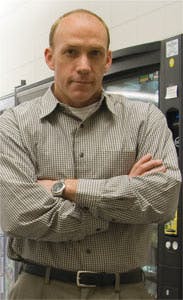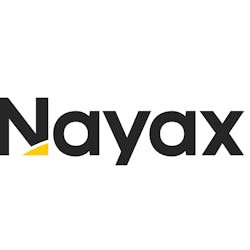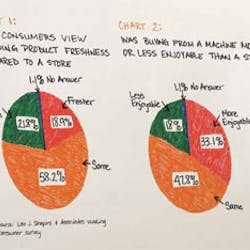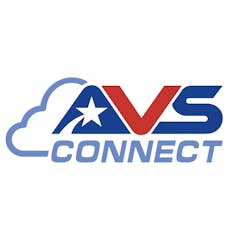The current business scenario forces the vending operator community to search its soul. Veterans note that no time has challenged the vending operator as much as the present, as costs rise, the customer base shrinks and consumers are reluctant to spend money.
The recession has accelerated pressures that have been at work since 9/11, giving new urgency to the need to assess the future.
For some, this means selling the business, assuming they can get a reasonable offer. For others, it means outlining their business goals more clearly than they have in the past and having a formal strategy for achieving them.
Most operators in recent months have, on some level, asked themselves the question: is this business worth the time and trouble it requires?
For some, the answer is “no.” For others, it is a qualified “yes.” One point that most agree on is that the effort required is greater than it was when they first got into the business, whether it was 10, 20, 30 or more years ago.
Automatic Merchandiser has frequently observed that vending remains one of the last entrepreneurial industries. Where many industries, such as office products, supermarkets and mass merchants, have consolidated, vending is one of the few in which an
individual can, with relatively limited resources, establish a business that is profitable enough to provide a good living. This has been the case since merchandise vending became a recognized industry early in the last century. Based on recent interviews with operators of varying ages in different sizes of companies, Automatic Merchandiser maintains that the axiom still holds true today.
All operators interviewed agreed that the industry is changing in a way that demands a higher level of professionalism. Most believe that technology will facilitate this professionalism and give it a better reputation among the buying public.
One of the more positive observations is that the current challenges are weeding out the less capable and committed players. Some operators welcome the current “survival mode” intensity as a catalyst to accelerate positive change.
“A bad economy is actually going to force some of those things to accelerate,” said Mike Mosakowski, the Kansas City, Mo. general manager for Aramark Refreshment Services. Mosakowski said the future is great because technology will reduce operating costs and maximize sales.
WIDESPREAD BELIEF: TECHNOLOGY IS CHANGING THINGS
Where rising costs and limited growth opportunities have stalled investment in new technologies, recent interviews reveal a widespread acceptance that new technologies, namely cashless readers and remote machine monitoring, will become commonplace. Many said they believe that return on investment for these technologies will be more favorable in the future.
Many veterans view the current recession as another business cycle that needs to be weathered by all industries and all segments of society. Those who voiced this view noted recessions remind them of some of the advantages that vending has over other businesses.
As a service provider, a vending operator can review his sales strategy and target new customers. He can redeploy assets in more lucrative locations and/or reduce capital outlay. Hence, vending offers a business owner more strategic options than owners in many other industries.
This versatility, however, comes with a price. It demands constant review of financial results in order for an operation to remain profitable and grow. Hence, operators that do not maintain reliable financial information and review performance regularly have less of a chance to succeed.
Rick Matthews, owner of H & L Tom’s Distributors Inc. in Virginia Beach, Va., was able to change his operating procedures to improve his profitability four years ago. As a result, he’s making more money today even though his same store sales are down 10 percent. This was accomplished by replacing step vans with more fuel efficient cargo vans, and moving from a static route schedule to a more flexible schedule. He also pre-kitted the trucks.
“It really puts us at the location when we service the machine more at a time when we need to be there,” he said. This has allowed him to eliminate two routes.
ON THE HORIZON: REMOTE MACHINE MONITORING
Matthews isn’t finished exploring more efficient ways to operate. He is presently testing InOne’s remote machine monitoring software. “When we get done integrating that, we’re going to have a huge leap forward as far as efficiency goes,” he said.
Matthews echoed other operators in noting the personal fulfillment he feels running a family business and having a love of the industry. “I’m having the time of my life,” he said.
Dave Heaton, co-owner of Enterprise Vending in Cincinnati, Ohio, said having a cash business is a great advantage. He also thinks it’s advantageous being able to focus his resources as he sees fit, such as adding more sales people when necessary to grow the business.
Heaton would not discourage his kids from getting into the business if they so choose.
Dominic Finelli, co-owner of Custom Vending Inc. in Silver Spring, Md., likes the excitement the industry offers. “Every day is something new,” said the 62-year-old veteran. “It’s never a set pattern. I’ve enjoyed myself.”
Finelli thinks that over the years, the industry has become more professional, and he thinks that there is room for new players who are committed to excellence.
Many operators noted that those who invest in long-term growth will succeed.
However, one of the most somber assessments came from one of the most progressive operators in the country, Marc Whitener, owner of Refreshment Services LLC, a 41-route operation in Norco, La.
The fact that one of the nation’s most progressive operators does not present the future in glowing terms underscores the seriousness of the challenges facing the operator community.
Whitener has been a leader in investing in vending technology and is a driving force behind the Sprout initiative, a partnership between Cantaloupe Systems and the Vend Marketing Institute (a nationwide coalition of 17 operators serving different geographic markets) to embed technology, improve operational efficiency and develop interactive consumer programs for vending locations.
While Whitener is an industry pioneer, he was one of the few operators interviewed who said he would not choose vending if he had the option of reliving the last 20 years. “Our performance over the last 20 years hasn’t been very robust,” Whitener said, comparing vending to some other industries, including some that vending operators compete against (fast feeders and c-stores).
Whitener believes the industry can change its direction, which is why he continues to take a leadership role in Sprout. “If we continue to focus on cost and splitting up business among ourselves, it’s not good.”
Richard Harvey, president of A & R Services in Monument, Colo., another operator who has taken an aggressive role with vending technology, offers a similar assessment. “I’m not extremely optimistic about the industry as a whole if it doesn’t change,” said Harvey, who is president of his state vending association.
NEW DIRECTION CALLED FOR
Harvey points to the changing role that c-stores and other competitors have taken in recent years and believes that vending also has to change in order to remain a viable industry. “We need to start getting into something else beyond soda and snacks,” he said. “We need to get to the point where we’re selling things that are more expensive.”
While some operators lament the pressures on profitability, others worry that there isn’t enough pressure to weed out those who cut corners to offer low prices and high commissions, which make it harder for good operators to succeed. Harvey is among those who wish it were harder to get into vending.
Many operators noted that the industry has some unique advantages. One of the most common being that it’s a cash business. There are no receivables in vending.
While sales fall for businesses in general during a recession, the problem is compounded for those that have receivables. Receivables force many into bankruptcy.
Another common theme was the enjoyment of working with people.
While vending is a capital intensive business, modern equipment is capable of serving locations for many years. Most operators can expect to continue using the machines for many years after they are paid for.
Scott Meskin, co-owner of Black Tie Services Inc. in Baltimore, Md., believes there is a certain amount of financial flexibility operators can look forward to once they reduce their debts.
Meskin also believes that vending remains an important niche to the American work place as employers value keeping their workers onsite instead of leaving for meals.
Greg Maclean, owner of C&M Vending Co., a 5-route operation in Denver, Colo., agreed with Meskin that a reduction in debt will give him some flexibility, which he feels he needs due to rising product costs. The increasing cost of operating has left Maclean unenthusiastic for companies of his size. He thinks the one- and two-person operations will be better able to withstand the costs of insurance, employee benefits and sales taxes.
WILL THERE BE ROOM FOR NEW PLAYERS?
James Bryan, owner of Eagle Vending Co. Inc. in Marietta, Ga., thinks it will be much harder for newbies to accomplish what he did when he in started the business 26 years ago.
Bryan got into vending after holding a corporate job. He took an equity loan on his house and borrowed money from relatives to raise $100,000 to start the business. It took about five years to pay off most of his startup debt.
Does he believe someone else could succeed with $100,000 in startup capital? If they know what they are doing, he thinks they could. “I think it could still be done,” he said.
“I think it’s more depression proof than most businesses are,” said Bob Chambers, chairman and CEO of Automatic Chef Inc. in Waco, Texas, a long-time veteran. Chambers, whose company became a Canteen franchisee five years ago, thinks the future favors the very big and the very small. While his company’s same store sales are 4 percent down this year, profitability is up, which he credits to the buying power and clout of Canteen.
Mike Donohue, owner of Diverse Food Systems Inc. in Sacramento, Calif., a 45-year industry veteran, said it’s important for people to realize that the traditional way of doing things can’t continue. Vending machines have been hammered by c-stores that offer more product variety. He thinks there will be a place for the very small and the very large companies. It’s the medium layer of players that face an uncertain future.
“We’re going to have to learn to have fewer employees and have those people be as effective as we can,” said Mac Bellingrath III, owner of Automated Refreshments of Arkansas Inc., a 20-route operation in Pine Bluff, Ark.
Getting into the business today requires more capital than in years past, but vending continues to offer a rewarding career to those who understand the depth of commitment required and are willing to make it.








